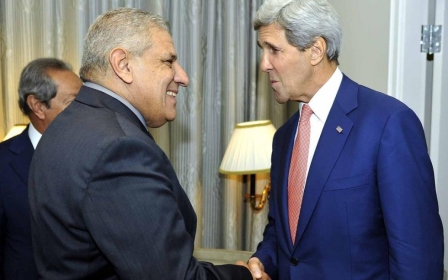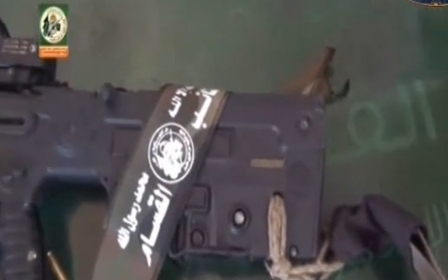Hamas’s West Bank leader indicted on terrorism charges

Hamas’s leader in the West Bank, was indicted on terrorism charges on Thursday, following his arrest back in May.
Riad Natzer, who has headed the group’s West Bank operations since 2010, stands accused of raising 1.5 m shekels ($430,000) for terror operations, as well arming and training Hamas members to carry out attacks on Israeli settlements. His case is being dealt with by the Israeli military’s special courts in the West Bank, the Jerusalem Post reported.
Natzer was arrested on 27 May, almost two weeks before Operation Brothers’ Keeper began. The operation, launched in response to the kidnapping and killing of three Israeli settler teens, lead to a widespread Israeli crackdown.
The case and the arrest have been under a gag order until now.
Ceasefire
The news comes as Israel reportedly said it had agreed to extend a three-day ceasefire in the Gaza Strip for another 72 hours, according to the Israeli Foreign Ministry.
"I can confirm that Israel has agreed to an Egyptian proposal to unconditionally extend the ceasefire for another 72 hours," ministry spokesman Yigal Palmor told reporters on Thursday.
"I don't know about Hamas' position regarding this," he said.
Israel and Palestinian factions are currently observing an Egyptian-brokered three-day ceasefire that came into effect on Tuesday morning and is expected to expire at 0500GMT Friday, unless extended.
The two sides are currently in Cairo for indirect talks aimed at reaching a long-term ceasefire agreement.
Palmor declined to discuss the contents of the Cairo talks.
Earlier on Thursday, three EU countries reportedly presented Israel with a plan to rehabilitate the Gaza Strip, in exchange for international supervision to prevent Hamas and other groups from rearming.
Germany, France and Britain met with Israeli National Security Advisor Yossi Cohen in Jerusalem on Wednesday and gave him a two-page document outlining the proposal's principles, Israeli daily Haaretz reported.
The principles are: preventing the arming of Hamas and other organisations with fighters in Gaza; rehabilitating the Gaza Strip in cooperation with the international community and Palestinian Authority (PA); enabling the transfer of humanitarian aid; setting up an international mechanism to prevent prohibited materials from reaching the Strip; ensuring that cement and iron, used for rebuilding Gaza, do not fall in the hands of organisations; returning the PA and President Mahmoud Abbas to Gaza; and potentially returning EU observers to the Rafah border alongside the Palestinian presidential guard.
Cohen was said to have expressed interest in working with the EU diplomats to advance the proposal, Haaretz reported.
There was no immediate reaction from Hamas or Islamic Jihad to the reported proposal.
At odds over prolonging truce
Overnight and early into Thursday, Israel and Hamas appeared to be at odds over prolonging the truce.
Israel is now backing an unconditional extension, but Senior Hamas leader Moussa Abu Marzouq on Wednesday denied that Hamas had also backed an extension.
"There is no agreement on extending the lull with Israel," Abu Marzouq wrote on his Twitter account on Wednesday.
"Any news about the extension of the truce is unfounded," added Hamas spokesman Sami Abu Zuhri.
A second Israeli delegation also arrived in Cairo late Wednesday, joining an earlier delegation that came Tuesday. Both are now believed to be holding indirect talks with representatives of Hamas and Islamic Jihad, a security source at the Cairo airport said.
Last day of silence?
Guns have stayed silent in the tiny Palestinian enclave since the truce began on Tuesday, bringing relief to millions of people on both sides after the killing of 1,886 Palestinians (mainly civilians) and 67 Israelis (mainly soldiers).
A spokeswoman for the Israeli army said 27,000 reservists called up for the conflict had been sent home, leaving a force of 55,000 still on active duty, in another sign of growing hopes for a long-term deal.
In the battered Gaza Strip, shops, banks and markets have reopened, and people crowded into the streets, although the extent of the damage means that life has not been able to return to normal.
Tensions remain and MEE contributor Mohammed Omer, who is currently in Rafah, said that people were again forced to flee on Thursday morning after they heard news that the area would be bombed, despite the ceasefire.
"In three minutes," Omer said, "all homes that have tuck-tucks [small cars] had to take to the streets looking for shelter."
However, none of the homes were bombed, although the carnage of the last month remains clearly visible.
"I can smell remains of dead bodies in the garage of ambulances nearby,” Omer said. “Ironically, in the same place, several babies have just been born in the last two hours.
Israel says actions 'proportionate'
Nearly half a million Palestinians were displaced by Israeli bombardment, and many are still sheltering in schools after their homes were flattened in the offensive.
"Look at my house, it is totally smashed. How can my children live here?" asked, Mussa Abu al-Rus, whose house had been taken over by Israeli soldiers.
The extent of the carnage has prompted international condemnation.
UN Secretary General Ban Ki-moon warned that after three wars in Gaza in six years, international patience with both sides is being tested.
He opened a special meeting of the UN General Assembly on Wednesday with an appeal for a lasting peace.
"The senseless cycle of suffering in Gaza and the West Bank, as well as in Israel, must end," he said.
US President Barack also weighed in, saying that while he supported the talks, "long-term, there [had] to be a recognition that Gaza cannot sustain itself permanently closed off from the world."
"I have no sympathy for Hamas. I have great sympathy for ordinary people who are struggling within Gaza," Obama added.
Israeli Prime Minister Benjamin Netanyahu meanwhile has launched a vigorous defence of the conflict
"I think it was justified. I think it was proportionate and that doesn't in any way take away the deep regret we have for the loss of a single civilian casualty," Netanyahu said on Wednesday, in his first public remarks since the ceasefire came into effect.
New MEE newsletter: Jerusalem Dispatch
Sign up to get the latest insights and analysis on Israel-Palestine, alongside Turkey Unpacked and other MEE newsletters
Middle East Eye delivers independent and unrivalled coverage and analysis of the Middle East, North Africa and beyond. To learn more about republishing this content and the associated fees, please fill out this form. More about MEE can be found here.



